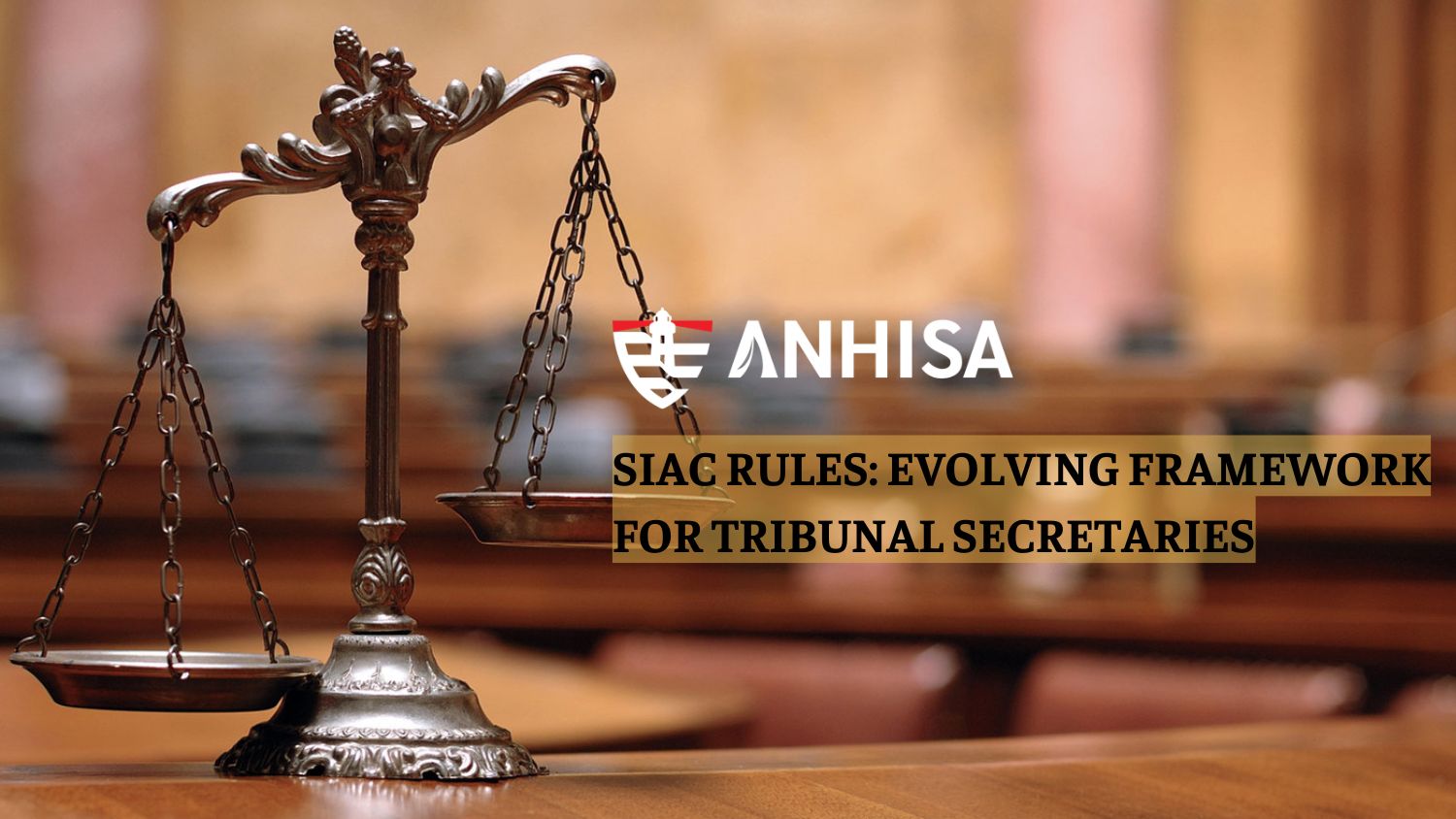Foreword
The Singapore International Arbitration Centre (SIAC) continues to showcase its dedication to a robust, modern, and efficient arbitration framework. The latest amendments to the SIAC Rules introduce key refinements, particularly under Rule 11 and Rule 24, which address the regulation of tribunal secretaries and the introduction of administrative conferences. These updates signify SIAC’s commitment to addressing procedural clarity and efficiency in international arbitration. This article explores the rationale behind these amendments, their implications, and how they align with international arbitration practices, including those of the ICC, Hong Kong International Arbitration Centre (HKIAC), and UNCITRAL.
In prior iterations of the SIAC Rules, the role of tribunal secretaries was not explicitly addressed. This absence often led to uncertainties regarding the scope of their duties, appointment processes, and permissible involvement in arbitral proceedings. The revised SIAC Rules address these gaps comprehensively:
- Rule 24 delineates the appointment process and responsibilities of tribunal secretaries. It mandates transparency in their selection and ensures that all parties agree to their involvement.
- Rule 11 explicitly prohibits delegation of decision-making functions to tribunal secretaries, preserving the integrity of the arbitral process.
By codifying these provisions, SIAC seeks to instill confidence in its procedures, reducing the potential for disputes arising from unclear delegation practices. This structured approach aligns SIAC with international practices adopted by other institutions like the ICC, which also emphasizes the importance of transparency and party consent in the use of tribunal secretaries.
Administrative Conferences under Rule 11: A Procedural Innovation
New Approach to Procedural Efficiency
The revised Rule 11 empowers the Registrar of SIAC to convene administrative conferences with parties before the constitution of the arbitral tribunal. Previously, procedural and administrative discussions were typically deferred until after the tribunal’s formation, often during the first CMC or procedural hearing. The introduction of this early-stage mechanism facilitates prompt discussions on procedural and logistical matters, ensuring smoother case management from the outset.
Advantages of Administrative Conferences
The administrative conference mechanism offers significant benefits in various scenarios, such as:
Emergency Arbitration Proceedings: When an Emergency Arbitration application is filed before the tribunal’s constitution, the administrative conference allows parties to address urgent procedural issues without delay.
Complex Tribunal Appointment Processes: In cases involving disputes over arbitrator selection or challenges to proposed candidates, the administrative conference serves as a platform for resolving these complexities efficiently, avoiding potential bottlenecks.
Consolidated or Coordinated Proceedings: For cases involving multiple related claims under SIAC’s Consolidated Proceedings or Coordinated Proceedings mechanisms, the administrative conference ensures consistency in procedural arrangements and helps align the expectations of all parties involved.
By formalizing this mechanism, Rule 11 enhances procedural efficiency and reduces delays, setting a new standard for early-stage case management in arbitration.

Tribunal Secretaries under Rule 24: Defining Roles and Responsibilities
Addressing Previous Uncertainties
Earlier versions of the SIAC Rules did not explicitly regulate tribunal secretaries, leading to ambiguities about their roles, appointment processes, and permissible activities. This lack of clarity often resulted in reliance on ad hoc agreements, creating potential for disputes and inefficiencies.
Codified Standards for Tribunal Secretaries
Rule 24 introduces comprehensive provisions to address these gaps:
Appointment and Transparency: Rule 24 mandates that the appointment of tribunal secretaries must be transparent, requiring the consent of all parties involved. This ensures mutual agreement on the secretary’s role and scope of involvement.
Preservation of Arbitrators’ Authority: The rule explicitly prohibits tribunal secretaries from performing core judicial functions, such as decision-making, preserving the integrity of the arbitral process.
By establishing these guidelines, SIAC aligns itself with leading arbitration institutions like the ICC, which similarly emphasizes transparency and party consent in the use of tribunal secretaries.
Essential Contributions of Tribunal Secretaries
Tribunal secretaries play a pivotal role in supporting the smooth functioning of arbitration proceedings. Their contributions include:
Administrative Support: Managing logistical tasks, such as organizing hearings, maintaining case records, and facilitating communication between parties, allowing arbitrators to concentrate on substantive issues.
Cost-Effectiveness: Delegating routine tasks to tribunal secretaries can significantly reduce overall costs, as their fees are typically lower than those of arbitrators.
Enhanced Efficiency: With secretaries managing time-intensive administrative duties, arbitrators can focus more on legal and procedural matters, expediting case resolution.
Expert Assistance: In complex arbitrations, tribunal secretaries with specialized knowledge can ensure procedural compliance and provide valuable insights.

Alignment with International Best Practices
SIAC’s updated approach to tribunal secretaries under Rule 24 reflects global standards and lessons from other leading institutions:
ICC Note on Administrative Secretaries (2021)
The ICC highlights the importance of transparency in the appointment of tribunal secretaries.
As outlined in Section XX (Paragraphs 215–226)[1] of the ICC Note to Parties and Arbitral Tribunals on the Conduct of Arbitration, tribunal secretaries must meet the same standards of independence and impartiality as arbitrators. Party consent is required for their appointment, and their role is strictly administrative, preventing any involvement in judicial decision-making. These measures ensure clarity and protect the integrity of the arbitral process.
Guidelines On The Use Of A Secretary To The Arbitral Tribunal of HKIAC (2024):
The role of Tribunal Secretaries is governed by the HKIAC Guidelines on the Use of a Secretary to the Arbitral Tribunal, which sets out clear standards and procedures for their appointment and duties. According to these guidelines, tribunal secretaries support arbitrators by assisting in administrative tasks, case management, and ensuring the smooth progress of arbitration proceedings. They play a crucial role in facilitating efficient communication between parties and the tribunal, organizing hearings, and preparing documents. However, the guidelines explicitly prohibit secretaries from engaging in judicial functions or drafting substantive parts of awards. Clause 2.2 of the guidelines also mandates that arbitrators must disclose their intended use of tribunal secretaries and obtain prior approval from the parties involved, maintaining transparency and ensuring fair practice throughout the arbitration process[2].
Conclusion: A Forward-Looking Framework
The amendments to the SIAC Rules under Rule 11 and Rule 24 underscore SIAC’s responsiveness to the evolving demands of international arbitration. By formalizing the use of administrative conferences and defining the roles of tribunal secretaries, SIAC enhances procedural integrity and efficiency. These changes position SIAC as a leader among arbitration institutions, setting a benchmark for transparency and party-centered practices.
SIAC’s revised rules not only address past ambiguities but also reflect its proactive stance in adapting to contemporary challenges. This ensures that SIAC remains a preferred choice for users seeking efficient, reliable, and modern arbitration services.
[1] ICC Note to Parties and Arbitral Tribunals on the Conduct of Arbitration (2021), Section XX: Administrative Secretaries, Paragraphs 215–226. Available at: https://iccwbo.org/publication/note-parties-arbitral-tribunals-conduct-arbitration
[2] HKIAC, Guidelines on the Use of a Secretary to the Arbitral Tribunal (Hong Kong, 2024), available at: HKIAC Guidelines on Use of Secretary to Arbitral Tribunal.
ANHISA LLC AND OUR EXPERTISE
ANHISA LLC is a boutique law firm specializing in Dispute Resolution, Shipping and Aviation. Being the leading lawyers in various fields of law, our qualified, experienced, and supportive team of lawyers know how to best proceed with a case against or in relation to Vietnamese parties and are well equipped to provide clients with cost-effective and innovative solutions to their problems.
Regarding dispute resolution, we have represented Vietnamese and foreign clients in the resolution of disputes involving maritime, construction, commercial and civil matters. Our lawyers are well-equipped to offer services on a wide range of disputes and conflicts, whether cross-border or purely domestic, to appear before any Judges or Arbitral Tribunals. The firm is prepared to assist clients in designing the appropriate dispute resolution procedure to help resolve conflicts as efficiently and cost effectively as possible, which may involve combining elements of mediation and other methods such as arbitration.
AUTHORS
DANG VIET ANH
Managing Partner
Mobile: (+84) 983 467070
Email: [email protected]
TRUONG CONG HONG
Senior Associate
Mobile: (+84) 909 814090
Email: [email protected]
NGUYEN THI THAO VAN
Associate
Mobile: (+84) 383 552680
Email: [email protected]
This article aims to furnish our clients and contacts with general information on the relevant topic for reference purposes only, without creating any duty of care on the part of ANHISA. The information presented herein is not intended to serve, nor should it be considered, as a substitute for legal or other professional advice.
